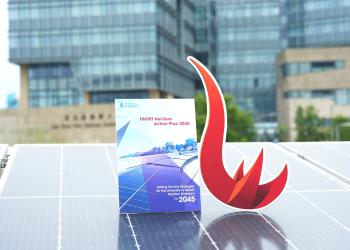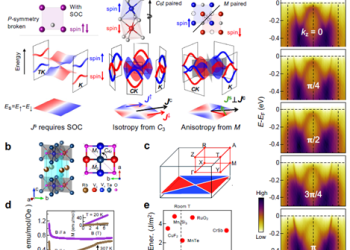Tasty Food Science
The Common Core Program, an integral component of the undergraduate curriculum at HKUST, aspires to bring students from all disciplines a balanced and broad education that nurtures them to be responsible citizens and independent thinkers with the heart and aspiration to excel in their endeavors. Among a wide array of common core programs, “Introduction to Food Science and Technology” remains the top choice of students because it serves up an appetizing experience: they get to make bread, cookies, tofu, and beer, and learn why some food tastes better deep fried.

Moreover, students taking this course have classes in an extraordinary half-kitchen half-laboratory setting: besides standard kitchen equipment, including stoves, ovens, and blenders, its dedicated and spacious laboratory is also fitted with geekier contraptions, like incubators, evaporators, and centrifuge equipment.
“We cook together, but it’s not a cooking class. I always make it clear in the first class. The lab’s not a kitchen. It’s a chemical engineering lab,” emphasizes course instructor Prof. Marshal LIU Yuanshuai, Assistant Professor of Engineering Education from the Department of Chemical and Biological Engineering.
In laboratory experiments, Prof. Liu guides students to reflect on the science behind while making food together. In the bread session, for instance, he would demonstrate and explain some intriguing phenomena: What does fermentation do to the dough? How does kneading help bread get the perfect crust and crumb?
“Equally importantly, the experiments also lead to discussions of a healthy diet when students realize how much sugar goes into their cookies,” he says. While eating and drinking is usually banned in class, an exception was made for this course as tasting is an essential final leg in the journey of food.
Read another related article: Eat Your Spoons and Forks to Beat Pollution
Designed by Prof. Liu from scratch and launched in 2017, the course, regarded as “eye-opening”, “thought-provoking”, and “rewarding and unforgettable” by his students, has just earned him the HKUST Common Core Teaching Excellence Award 2019.
Offered in summer, Prof. Liu’s course has a cap of 60 students, and experiments are done with two groups as safety regulations limit the laboratory to a maximum of 30 students. In the first class, he typically opens the course with a sobering slide entitled “Which of the following is wrong?” with dozens of statements of popular or cultural health beliefs, including “bone soup can be used to supplement calcium significantly” and “herbal teas can expel heat from our body and combat sticky humidity”. Students almost always fall for them, but none is supported by science.
So this “experiential” course aims to debunk misconceptions about food and provide students with fundamental knowledge of food science, which incorporates multiple scientific disciplines, including chemistry, nutrition, and microbiology. It also explores food safety and inspires thought about food processing technologies.
An ongoing trend that worries Prof. Liu is the common habit of having functional food or supplements that claim to promote well-being or bolster resistance to disease. “If a food could help fight disease, scientists would make drugs out of them. So, when you are well, you eat food; when unwell, you take drugs,” he says. “You shouldn’t have to have drug-like food when you’re well.”
“This course is also about critical thinking. I try to inspire students to step back and think scientifically before they make food-related decisions in their daily lives,” he says.
Prof. Liu puts the popularity of the course down to his passion for the subject, love for students, and working hard and smart. “I try to teach different students with different strategies, depending on their needs,” he says.
Read another related article: Igniting Passion for Physics
The self-taught food scientist, whose doctorate was in chemical engineering, practices what he preaches by starting the day with the same, wholesome breakfast for the last 20 years: “Oatmeal, milk, egg, fruits, and some nuts. Every single day. Oatmeal and bread for the carbohydrate, egg for protein, nuts and fruits for fiber and vitamins,” he explains.
As Prof. Liu sees it, the need for accurate knowledge about food is especially compelling, given false information is spreading widely on social media nowadays. “For something as important as food, we should always be guided by science,” he says.









